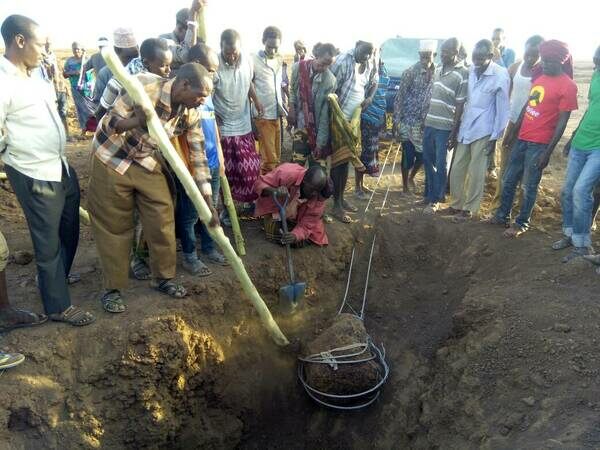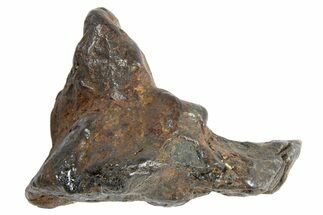2.85" Polished Sericho Pallasite Meteorite (40.7 g) Slice - Kenya
This is a 2.85" wide (40.7 grams) sliced and polished piece of a Sericho pallasite meteorite.
It comes with a floating frame display case.
It comes with a floating frame display case.
About Sericho Pallasites
Sericho pallasite meteorites are found in a 45-kilometer strewn field in eastern Kenya, near the village of Habaswein. This meteorite was officially "discovered" in 2016 after two brothers searching for their camels came across pieces of it. No other rocks were in the area, so they concluded that the rocks might be from space. Villagers spent several weeks collecting the material before bringing it to the attention of meteorite hunters. It was officially classified in 2018. Even today, material is still being found.
Approximately 2,800 kilograms of Sericho pallasite have been recovered since the initial discovery. The majority of these pieces are over 50 kilograms in weight, showing minimal weathering and still retaining patches of fusion crust. It is unknown when the fall originally occurred.
Sericho pallasite has rounded, gemmy olivine crystals varying in color from green to orange. Often its metal-rich areas show well-developed Widmanstätten patterns. They also have a particularly high olivine crystal density, as high as 70-80% in many specimens. It is quite attractive, particularly when sliced thin so light can pass through the olivine pockets: this makes it popular among collectors.
Sericho pallasite meteorites are found in a 45-kilometer strewn field in eastern Kenya, near the village of Habaswein. This meteorite was officially "discovered" in 2016 after two brothers searching for their camels came across pieces of it. No other rocks were in the area, so they concluded that the rocks might be from space. Villagers spent several weeks collecting the material before bringing it to the attention of meteorite hunters. It was officially classified in 2018. Even today, material is still being found.
Approximately 2,800 kilograms of Sericho pallasite have been recovered since the initial discovery. The majority of these pieces are over 50 kilograms in weight, showing minimal weathering and still retaining patches of fusion crust. It is unknown when the fall originally occurred.
Sericho pallasite has rounded, gemmy olivine crystals varying in color from green to orange. Often its metal-rich areas show well-developed Widmanstätten patterns. They also have a particularly high olivine crystal density, as high as 70-80% in many specimens. It is quite attractive, particularly when sliced thin so light can pass through the olivine pockets: this makes it popular among collectors.
About Pallasites
Pallasite meteorites are a class of stony-iron meteorites. They were once believed to have originated at the core-mantle boundary of asteroids that shattered through impacts, but a recent hypothesis is that they are a mixture of core and mantle minerals.
Pallasite meteorites consist of olivine (peridot) crystals surrounded by iron-nickel matrix. Upon acid etching, some pallasites display interweaving structures known as Widmanstätten patterns (or Thomson lines) in the metallic matrix. These structures are iron-nickel alloy crystals, typically kamacite and taenite, that cooled over millions of years in the vacuum of space.
Pallasites are quite rare: only about 200 are known, and only four have had observed falls. This represents less than 0.2% of all classified meteorites!
Pallasite Care
Pallasites are even more susceptible than most iron meteorites to rusting and deterioration due to moisture in the atmosphere; proper care includes keeping them in moisture-free environments. This is particularly important in areas with high humidity, such as Florida. All pallasite material we sell has been stabilized in some way, which will help with this issue, but care still needs to be taken to keep your treasure in good condition. Keep pallasites stored in a moisture-free environment, preferably with a corrosion inhibitor such as silica gel beads or a dehumidifier.
Pallasite meteorites are a class of stony-iron meteorites. They were once believed to have originated at the core-mantle boundary of asteroids that shattered through impacts, but a recent hypothesis is that they are a mixture of core and mantle minerals.
Pallasite meteorites consist of olivine (peridot) crystals surrounded by iron-nickel matrix. Upon acid etching, some pallasites display interweaving structures known as Widmanstätten patterns (or Thomson lines) in the metallic matrix. These structures are iron-nickel alloy crystals, typically kamacite and taenite, that cooled over millions of years in the vacuum of space.
Pallasites are quite rare: only about 200 are known, and only four have had observed falls. This represents less than 0.2% of all classified meteorites!
Pallasite Care
Pallasites are even more susceptible than most iron meteorites to rusting and deterioration due to moisture in the atmosphere; proper care includes keeping them in moisture-free environments. This is particularly important in areas with high humidity, such as Florida. All pallasite material we sell has been stabilized in some way, which will help with this issue, but care still needs to be taken to keep your treasure in good condition. Keep pallasites stored in a moisture-free environment, preferably with a corrosion inhibitor such as silica gel beads or a dehumidifier.
TYPE
Pallasite
AGE
LOCATION
Sericho, Isiolo County, Kenya
SIZE
2.85 x 1.65", .15" thick, Weight: 40.7 grams
CATEGORY
SUB CATEGORY
ITEM
#300768
 Reviews
Reviews










